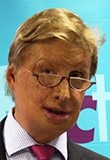 1 August 1976. A date to remember. Niki Lauda crashes, and the world stops.
1 August 1976. A date to remember. Niki Lauda crashes, and the world stops.
It stopped me in my tracks and forced me to think back. I had handed in my MSc thesis the day before and was set on a month’s holiday before starting a first—unexpected—job. Instead, it was four tough weeks reliving my accident and its aftermath through the news of Niki Lauda.
I sat with my parents that evening and we went back over the night when I had been in a car fire too. I wasn’t going at anything like the speed of Lauda but like him I failed to get around a corner. My parents had dropped everything and sped to my bedside. 40% burns. Severe facial burns. Just turned 18. Life in the balance. Survival was everything but even if I did survive, what future would I have with a face so traumatised?
Would Lauda pull through? Surely his motor racing days would be over? With a ruined face would his meaningful life be over? I desperately hoped not. I hoped for a new international role model who would tell the world that facial burns and disfigurement do not spell the end of meaningful life.
Over the next month I watched with increasing admiration as Lauda fought a public battle to get himself healed and fit enough to compete again—and I loved the reports that he was doing so against his doctors’ orders. I too had gone against medical advice by going to university just nine months after my accident—“surely it would be better to have some more surgery to get you looking better?” No way.
I shared what must have been his immense frustration as he withdrew from the Japanese Grand Prix because of the pouring rain. His badly burned eyes and lost tear ducts prevented clear vision. I knew what he was going through—my eyesight had been damaged in exactly the same way.
But it did not matter that he did not win the championship that year. He had proved to a massive worldwide audience that, if you survive, facial burns are not a barrier to living life to the full. I rejoiced. I saw far too few role models. By then I had started my first real job, something which gave me a tiny inkling that I too could make something of my life.
I was often asked in those days—and have been many times since—about the horrendous pain that Lauda (and I) must have gone through. How on earth did we bear it? What my five years of pain and surgery taught me was that resilience was not innate. It had to be learned. The pain that floored me in the first days and weeks after my accident became something that I soon discovered I had to mentally withstand because not to do so would consign me to deep sedation and powerlessness.
I became what I can only describe as bloody minded. “Focused,” as the modern idiom has it. Which doesn’t mean that I did not flinch at the pain of the wounds, the operations, and the dressing changes. But I told myself to bloody well hold fast. And the more I did, the stronger I felt. Niki Lauda epitomised bloody mindedness. I met him 10 years ago and he still did—and by all accounts, still does!
So I look forward to seeing ‘Rush.’ Not the accident itself, of course, but to witness Lauda’s refusal to buckle and his determination to buck the assumptions he must have had about his face—and everyone else had too. Niki: you are a true champion for face equality.
Competing interests: I declare that that I have read and understood the BMJ Group policy on declaration of interests and I have no relevant interests to declare.
James Partridge OBE is Founder and Chief Executive of Changing Faces, the leading UK charity supporting and representing people with disfigurements (www.changingfaces.org.uk). He is also founding Director of Dining with a Difference, a disability consultancy company.
